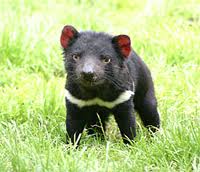Known for their enigmatic natures, Tasmanian Devils are nocturnal carnivores whose physical similarities resemble those of rats, only larger in size. Once considered as “devils” by British settlers of Australia in the past, their trademark guttural sounds have been pivotal in their naming, along with the rise of global interest directed towards them.
Recently, an already-discovered condition afflicting the little devils stands to be a risk for Tasmanian Devil populations, thinning out their numbers as the years trail on.
Described to be an “aggressive and contagious facial cancer”, the condition has left experts assuming the worst – if nothing is done, the entire Tasmanian Devil population would be extinct in the wild within five years’ time.
As a result, the Barrington Tops in Australia have recently become the home of to a pioneering batch of Tasmanian Devils, relocated for breeding, an initiative in aiding the devils in their battle for survival.
"Its viability at present seems critical," shares conservationist Tim Faulkner, referring to the Tasmanian Devil’s plight.
"In 1996 the disease was first found. Since then, you've had a 91 percent population decrease. There's no sign of a cure, there's no sign of a vaccine and there's no sign of the disease slowing up."
An estimated 1,236 acres has been allocated for Tasmanian Devils, dubbed “Devil Ark”, set in pristine national park. The area is geared to reflect natural habitat life for Tasmanian Devils, described as a “free range” captivity enclosure, with burrow-proof fences marking perimeters.
The Ark began with 24 babies, and has since been the home of a number happy Tasmanian Devils. They may be named “devils”, but they certainly are not devils in the sense many associate with the word.






No comments:
Post a Comment